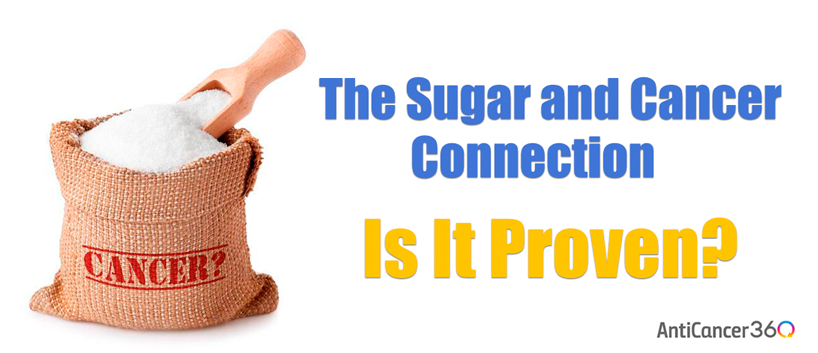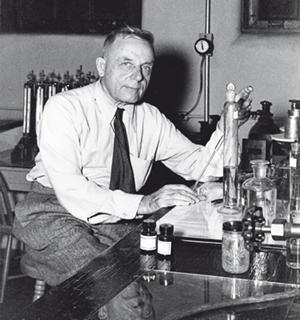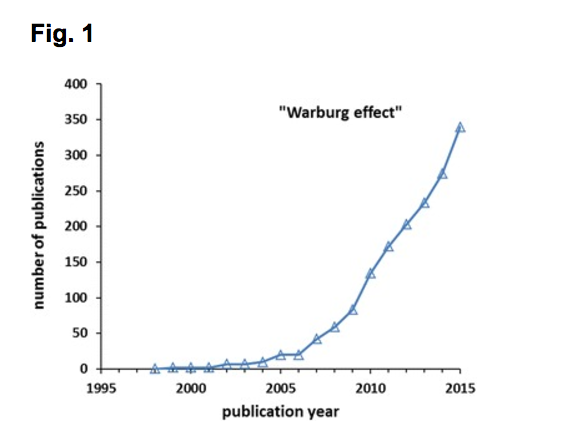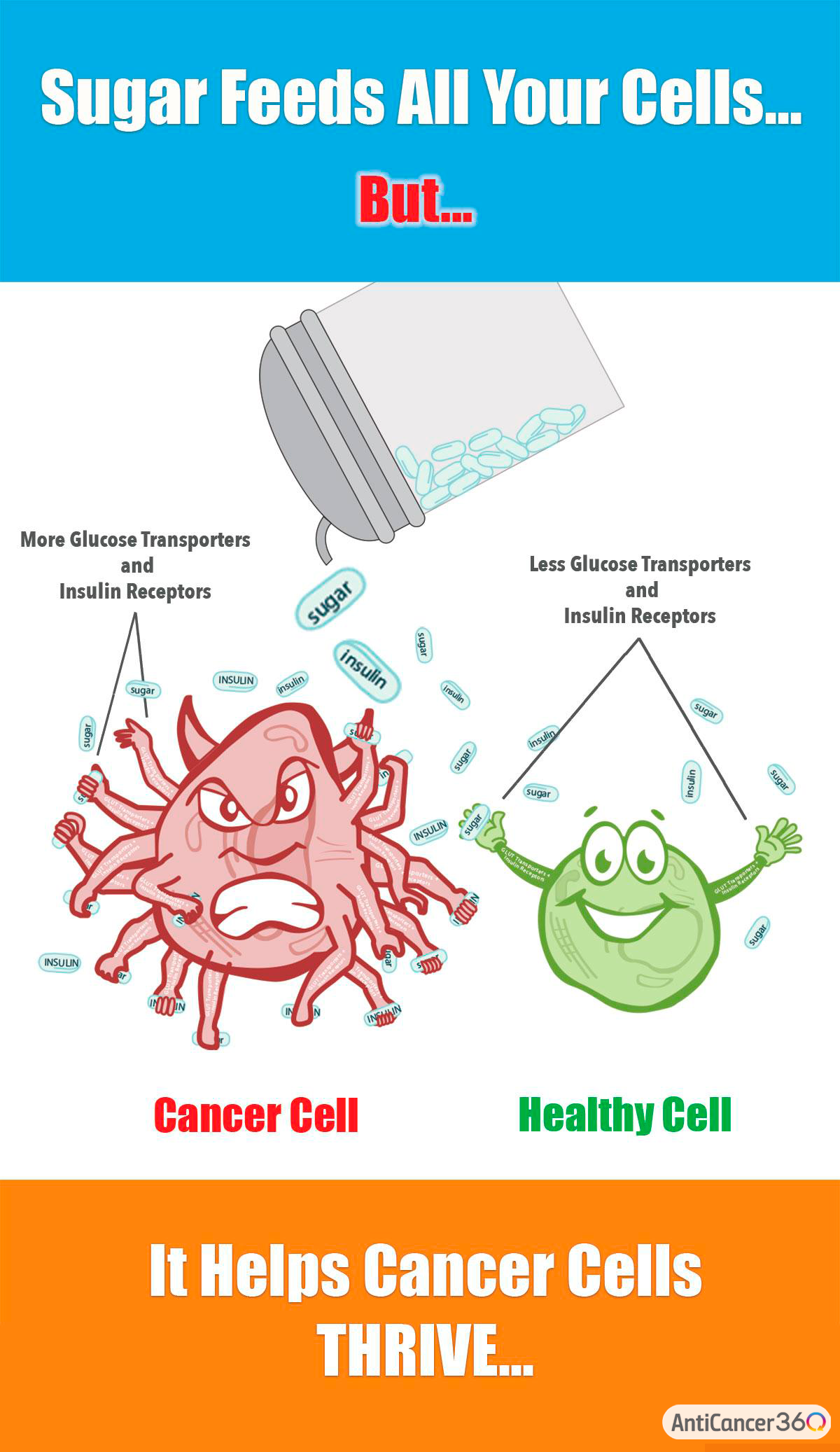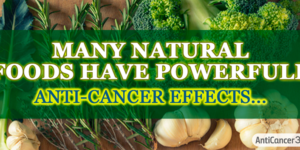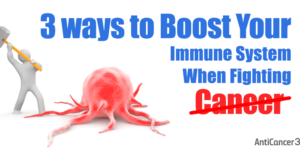Don’t have time to read? Here’s a quick summary:
- Cancer cells make energy in a deranged way. This requires them to burn more sugar to make the amount of energy needed for survival.
- Cancer involves both genetic and metabolic dysfunction at the cellular level (i.e. problems in the cell’s instructions for growth, and how they make energy…)
- The metabolic aspects of cancer have been overlooked for a long time… but it’s now experiencing a resurgence in cancer research.
- Sugar feeds ALL your cells, BUT it preferentially feeds cancer cells because they are better equipped to benefit from the sugar.
- In contrast to refined sugar, many whole foods sources of sugar also come with natural anticancer compounds.
- Refined carbohydrates can also activate pro-cancer cell mechanisms like Nf-kB and RAGE (receptors for advanced glycation end products.)
- So if you are fighting cancer, it is best either reduce your carbohydrate and sugar intake greatly (i.e. ketogenic diet)…. or eat only whole food sources of carbohydrate and sugar (i.e. whole food diets of various types.)
When it comes to cancer, whether you should avoid sugary foods is controversial. On one hand, you hear that “cancer feeds sugar.” Then you also hear that this is a “myth…” And both sides often have “credible” sources to cite, which makes it even more confusing. So what the actual relationship between sugar and cancer?
Like many things in medicine and health, this topic is more complex than a headline or quick statement can contain. So today we’re going to dive deeper into this issue to give you a better perspective.
We’re going to talk about:
- Where the “sugar feeds cancer” argument started
- Why the opponents say it’s a “myth”
- How refined sugar and fast burning carbohydrates affect cancer
- What you should do about it
Sugar and Cancer… It Started With Otto Warburg
When you look into the “sugar feeds cancer” arguments, you’ll undoubtedly hear about Dr. Otto Warburg. Warburg was a PhD biochemist, nobel prize winner, and is perhaps the most accomplished biochemist in history.
One of Warburg’s pioneering achievements was the discovery that cancer cells make energy differently than normal cells. Normal cells rely more on a oxygen dependant process called “respiration.” It’s only when they lack oxygen (like during heavy exercise) that healthy cells switch over to a process called “glycolysis.”
Dr. Otto Warburg
Nobel Prize Winning Biochemist
Most cancer cells on the other hand, rely more on glycolysis than respiration, even when there is enough oxygen present. To put it simply, their metabolism is deranged. This phenomenon seen in cancer cells has been termed the “Warburg Effect.”
Cancer Cells Need More Sugar Just To Survive
The problem is… glycolysis is very inefficient. Like all cells, cancer cells also need to make a certain amount of energy to survive. Respiration makes about 36 units of energy (ATP) for each molecule of glucose.
But glycolysis is much less efficient, and makes only 2 ATP per molecule of sugar. Thus… because of this 18x lower energy efficiency, cancer cells need to burn a lot more sugar, even just for survival [1].
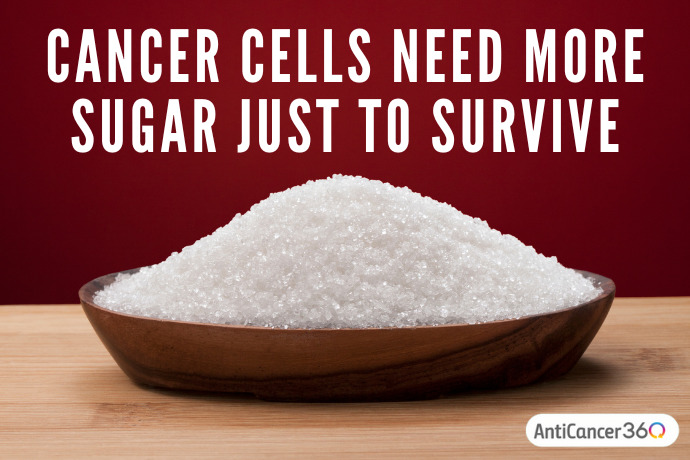
This phenomenon also allows oncologists to use “FDG-PET scans.” This technique involves injecting the patient with a radioactive form of sugar which shows up on a PET scan. The cancer cells take in more of this radioactive sugar than other cells. This allows you to visualize the tumor in contrast to your healthy tissues.
So it’s based on these concepts that people promote the connection between sugar and cancer.
The Big Debate: Is Cancer A Metabolic or Genetic Disease?
When looking into the sugar and cancer connection, you’ll see that it’s rooted in another fundamental debate. The question at hand is whether cancer is mainly caused by problems in the cell’s energy creation process (i.e. a metabolic disease), or if it’s because of gene mutations (i.e. genetic disease.)
After Otto Warburg’s era of research into cancer metabolics, the genetic model of cancer (thoroughly) took over. However, there has been a resurgence, especially in the last few years…
Whether as a cause or an effect of cancer, the focus on metabolic dysfunction has made its way back into the forefront of cancer research [2]. You can see this in the number of times the word “Warburg Effect” was used in scientific publications in the last few years.
Ultimately, even the genetics side of the debate has come to acknowledge the importance metabolic dysfunction in cancer (though as an effect, rather than cause). In fact, cancer metabolism has now been termed an “emerging hallmark of cancer” by leading cancer researchers[3],[4].
So while there have certainly been updates and clarifications on Otto Warburg’s work, the core of it still stands valid today.
Cell Metabolism, Sugar, and Cancer
Regardless of whether cancer is a metabolic disease, a genetic disease, or a bit of both… the metabolic aspects of cancer should still be addressed.
But, this aspect of cancer is overlooked and even ignored in many cases. This is clearly an issue, as cancer patients are often told to “eat whatever they can,” including foods that are high in sugar and refined carbohydrates.
“The book that my students have to use for their cancer biology course has no mention of cancer metabolism.”
~Dominic D’Agostino PhD
Associate Professor
University of South Florida
Morsani College of Medicine
Because cancer cell metabolism is often overlooked with standard cancer treatments… it’s important for you to know about these metabolic approaches to cancer. They can help to target cancers’ defective metabolism, and can often be used to increase the benefits of standard cancer treatments (i.e. chemotherapy, radiotherapy, surgery.) This combination of “complementary medicine” and “conventional medicine” creates an “integrative medicine” approach to cancer.
Antiglycolytics
One of these metabolic approaches involves blocking the cancer cells’ ability to utilize sugar (i.e. glycolysis) by using “antiglycolytic” substances. One example that’s been getting a lot of attention is a substance called “3 bromopyruvate.” This substance has shown exceptional cancer fighting potential[5],[6].
But while “3 bromopyruvate” is still in the research phase, there are a variety of natural antiglycolytics that we already use in an “integrative medicine” approach to cancer. These natural antiglycolytics include compounds like quercetin, resveratrol, and silybin[7],[8].
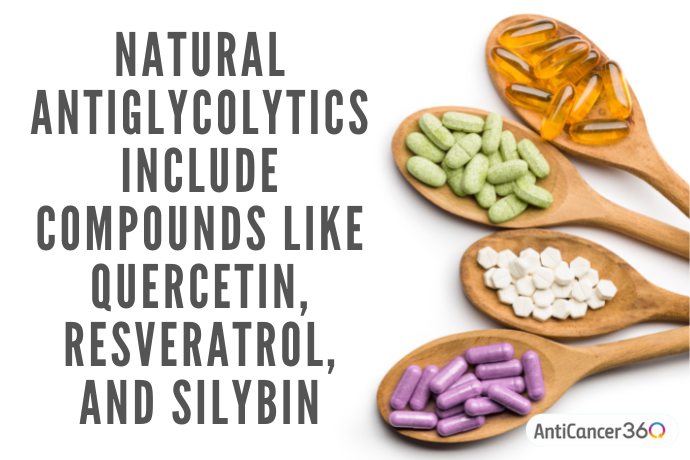
Most importantly… these natural substances are generally known to be safe. Quercetin for example is naturally present in onion, and resveratrol in grapes. We just use them at much higher concentrations than you couldn’t realistically get from food, and in highly absorbable formulations.
Many of these substances may also increase the benefit certain conventional treatments, while protecting from harmful side effects [9],[10],[11],[12],[13].
The Ketogenic Diet
Another metabolic approach that’s becoming increasing popular is the “ketogenic diet.” This involves restricting sugar and carbohydrate intake almost completely. The result is lower insulin and blood sugar levels overall, with the goal of “starving the cancer”.
While there are many factors to consider before starting a ketogenic diet, it is definitely a good option for certain cases. Preliminary studies have also found the ketogenic diet to be beneficial against cancer, even in the most severe cases [14],[15],[16].
All of these strategies show us the close relationship between sugar and cancer growth… AND how we can target this aspect of cancer.
Arguments Against “Sugar Feeds Cancer”
So before we get deeper into the sugar and cancer connection, let’s talk about some of the counter arguments. I routinely work with people who are told… “sugar doesn’t play a significant role in cancer.”
They are often told by their oncology team to “eat anything they can” to maximize their calorie intake, even if their foods are packed with sugar.
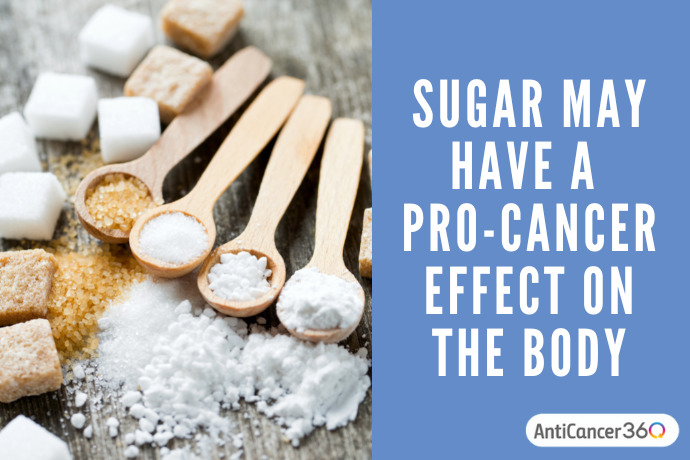
Though it’s important to prevent excessive weight loss, the last thing you want to do is to “preferentially feed the cancer” over your healthy cells. And in many cases, your doctors aren’t considering the pro-cancer effects that sugar may have on the body.
Here’s what people are often told about the “cancer feeds sugar” debate (and the flaws in their argument)…
Argument: All cells use use glucose for energy… not just cancer cells. They just consume more sugar because they are using more energy.
This is definitely an oversimplification… to the point of being misleading.
- All cells CAN use glucose for energy… But cancer cells are usually more dependent on glucose, while healthy cells are more flexible in what they can use to make energy.
- Cancer cells often consume more sugar because they are metabolically inefficient… not necessarily because they are using more energy [17].
Cancers Utilize Sugar More Effectively
Many cancers have a greater reliance on sugar, and are better adapted to utilizing sugar than normal cells. For instance, once the sugar is in your bloodstream, it still has to be transported into the cell [18]. This is done in part by transport proteins in the cell membrane called “GLUT transporters” (think of them like pumps.)
Many cancer cells build more of these glucose transporters [19],[20],[21]. This allows them to pump in greater amounts of sugar, allowing them to utilize sugar more rapidly than healthy cells.
Many cancer cells also have increased insulin receptors [22],[23],[24]. When your blood sugar rises (i.e. from eating sugar or carbohydrates), your body releases insulin to help your cells take up the sugar in your blood. One of the ways insulin does this is by “mobilizing” the glucose transporters that we talked about earlier [25],[26]. But even more than this, insulin can promote cancer growth by preventing “cancer cell suicide,” and stimulating cell division (i.e. growth) [27].
Because of these mechanisms, many cancer are better equipped to benefit from sugar, compared normal healthy cells.
Cancer cells usually need this increased sugar uptake ability because they are metabolically inefficient. Remember that glycolysis is 18x less efficient than respiration… Because of this, cancer cells require much more glucose to make a unit of energy. This also requires them to consume more sugar to generate a similar amount of energy as healthy cells [28].
So in essence cancer cells aren’t necessarily “using more energy”… Rather, they may be using more sugar… to make a similar amount of energy.
Cancer Cell Metabolism Is A Weakness To Exploit
Beyond this, healthy cells have greater flexibility in terms of the fuels they can use to survive. Cancer cells for instance, are generally unable to use ketones (fat) for fuel very efficiently [29] . Your normal cells on the other hand have no issues using ketones.
This is why some researchers and doctors support the ketogenic diet to help fight cancer. I myself also advocate a ketogenic diet, though I think people should be evaluated on case-by-case basis [30].
To put it simply…if you are aggressively spiking your blood sugar by consuming significant amounts of sugar and/or refined carbohydrates… cancer cells are often better equipped to benefit from it, than your healthy cells.
And on the other extreme… if you lower your blood sugar as much as possible and rely more on ketones for fuel, your healthy cells will be better equipped to benefit from your diet, compared to the cancer cells.
Different Sources of Sugar… Different Effects
Now, the ketogenic diet is only one of a few diets that can be beneficial when fighting cancer. And… these other dietary approaches generally include plenty of whole food carbohydrates.
So how about if you’re not going to use a ketogenic diet? Does it matter what kind of sugar or carbs you eat then?
Yes… you should still be aware of where your sugar and carbohydrates are coming from.
This brings us to another argument against the idea that “sugar feeds cancer.”
Argument: If sugar feeds cancer, then all the carbohydrates you eat feeds cancer, because they all turn into sugar in the body.
It’s true that most carbohydrates turn into blood sugar in your body. This is why the ketogenic diet greatly restricts all forms of carbohydrates.
BUT… even if you’re not on a ketogenic diet… different sources of sugar and carbohydrates can still vary greatly in how they react with the body. They can also differ in terms of the natural compounds that they do or don’t provide. Let’s look at some examples…
A study out of Cornell University investigated 11 different fruits, and how effectively they could block cancer cells in vitro [31] (in a petri dish.)
Out of all the fruits, apples got 3rd place… and they have 10g of sugar per 100g of fruit.
On the other hand, oranges didn’t even make the list, because it didn’t show much effect… and oranges have 9g of sugar per 100g of fruit.
So both of these foods contain a similar amount of sugar… but apples/ apple juice are likely to have greater anti-cancer effects than oranges/ orange juice… let alone refined sugar.
And… this isn’t even considering the anti-inflammatory effects that these fruits can provide. This can be beneficial because inflammation fuels cancer growth (more on this later.)
Note: As you can see in the diagram, cranberries got first place and lemons got second place. I just didn’t use these as examples because they are relatively low in sugar.
The Carbohydrate Paradox
Carbohydrates that are rich in anti-cancer nutrients also relates another question that I often get asked… which is:.
“How can these high carbohydrate anti-cancer diets make sense, considering the ketogenic diet?”
Though we don’t have rigorous science to support these diets (namely the Budwig and Gerson diets), there have been benefits reported anecdotally, and in clinical settings.
And what all of these high carbohydrate anti-cancer diets have in common is that their sugars and and carbohydrates come from natural foods that are rich in anti-cancer compounds.
In this case, the sugar (and subsequent insulin secreted by your body), may actually act as a “trojan horse” to help get these anti-cancer compounds in your tissues and cells more thoroughly [32].
Of course, this is only theoretical at this point from what I can see. But I still consider it relevant, because (as per my recommendations) it only encourages you to eat whole food, instead of refined sources sugar and carbohydrates.
So overall, if you are eating a higher carbohydrate diet, and want to do the most you can to heal from cancer… you should be conscious of where your sugars and carbohydrates are coming from.
Refined vs. Complex Carbohydrates
Aside from the differences in anti-cancer potential of certain high carb/ sugar foods… another consideration is the “glycemic index” and “glycemic load” of the foods you’re eating.
Glycemic index gives you an idea of how rapidly a food affects your blood sugar. Glycemic load considers both the speed, and the total amount of sugar/ carbohydrate that the food contains.
So why does this matter for cancer?
Because both higher glycemic index and glycemic load are associated with increased inflammation [33] and “advanced glycation end products” (AGEs) [34].
“Bad” Carbohydrates Can Support Cancer By Activating “NF-κB”
When you’re fighting cancer, you want to do everything you can to fight inflammation in the body. Inflammation is one of the main driving forces of cancer [35]… and one of the key players in this process is a cell pathway called “NF-κB” [36],[37].
Beyond inflammation, NF-κB also affect immune response, genetic stability, angiogenesis (tumor blood vessel growth), and adhesion molecules [38] (which help cancers metastasize). So as you can imagine, you want to inhibit NF-κB when fighting cancer… not activate it.
So back to the issue of sugar feeding cancer…
Carbohydrates do turn into sugar in the body… BUT… high glycemic carbohydrates for example can activate NF-κB [39]… which again, you want to avoid when fighting cancer.
Cancer researchers from all over the world are working against cancer by inhibiting NF-κB [40],[41],[42],[43]. NF-κB may also be involved in cancer’s resistance to treatments like chemotherapy and radiation [44],[45],[46].
So if you’re fighting cancer (or want to help prevent it), the last thing you want to do is to activate this pro-cancer pathway by consuming excess sugar and refined carbohydrates.
Minimizing Advanced Glycation End Products (AGEs)
Aside from increasing inflammation through NF-κB, high glycemic carbohydrates can also increase your levels of “advanced glycation end products” (AGEs) [47],[48],[49]. This is especially problematic if you are diabetic (or presumably, pre-diabetic) [50].
Though AGEs are involved in a variety of diseases, they may also be involved in cancer. Receptors for advanced glycation end products (RAGE) are found in many different (if not most) cancers, and may be involved in cancer cell survival and cancer growth [51]. They may also promote the ability of cancers to migrate, invade, and metastasize to other tissues [52],[53].
These AGE receptors are also involved in the process of inflammation. Remember NF-kb? The the central inflammation pathway that we talked about earlier? Activating RAGE can also activate that inflammatory pathway also [54].
Now to be fair, AGEs aren’t just formed in your body when you eat sugar and high glycemic foods (i.e. endogenous AGEs). Much of them are already present in a variety of foods (exogenous AGEs). The biggest culprits in this case are protein and fat rich animal products, especially when they are cooked with high heat methods.
But many of these foods should also be eliminate or minimize while on an anti-cancer diet.
Conclusion
So when you look deeper into the relationships between sugar and cancer, you see that both sides are oversimplifying the issue. Part of the misunderstanding is also an issues of semantics.
Ultimately, refined sugar and high glycemic carbohydrates are more likely to promote cancer growth than other sources of sugar and carbohydrates. But you’d still have to judge each food on a case by case basis.
There are a lot of different variables when it comes to cancer, so you want to have as many anti-cancer variables on your side as possible. Most importantly, some of these factors are overlooked by conventional treatments alone.
So if you’re going to include sugar and significant amounts of carbohydrates in your meals, here are some general guidelines that you can follow.
Please note: These are just general guidelines, and may differ depending on your particular situation.
- Eat sugars and carbohydrate in their their natural, whole food forms. The less processed and refined, the better.
- Avoid overeating carbohydrates overall… Once you determine how much your body needs, try to stick to that. If you need to increase your caloric intake, prioritize healthy fats and proteins first.
- Always include a source of healthy fat and protein when you eat carbohydrates. This will help to stabilize your blood sugar.
- If you are including juices in your diet, juice the fruit (or high sugar vegetable) yourself… or get it from a juice bar (rather than bottled). You should also emphasize the fruits that have greater anti-cancer abilities.
Ultimately, sugar is just one of many factors that can affect process of cancer. However, it’s one of the most important, due to its close relationship to cancer cell metabolism. Because of this, incorporating these tips above is important to help your body heal from cancer.
Did this article clarify the “sugar feeds cancer” debate for you? What are you thoughts? Let me know in the comments below, and be sure to share. 🙂
Are You A Candidate For Our Program?
If you’d like to learn more about the AntiCancer360 approach and see if we can help you… please watch our free online webinar to learn more about our approach. Then at the end, you’ll be able to schedule a free call with someone from our team so that we can discuss your case in more detail.
Gene Wei is a Board Certified Doctor of Oriental Medicine in the state of Florida, and the founder of AntiCancer360. He’s also a graduate of the University of California Los Angeles, and East West College of Natural Medicine.
His practice is focused on integrative and natural anticancer strategies. Over the years, he’s helped many people overcome difficult cancers… including some cases of “terminal cancer” which were able to be reversed with an “Aggressive Integrative Approach.”

